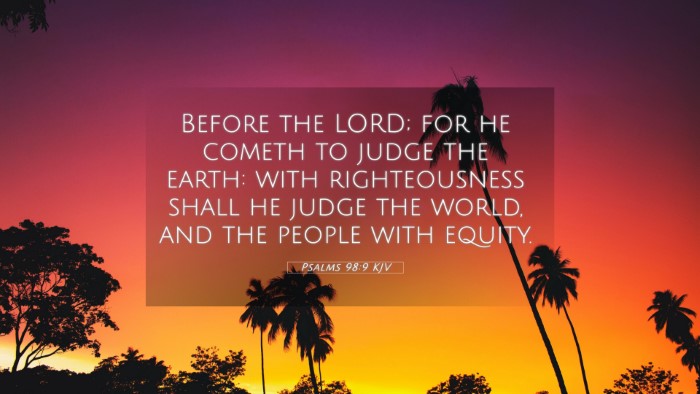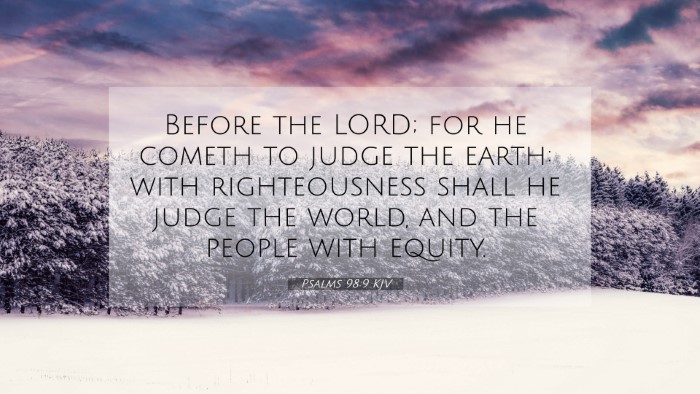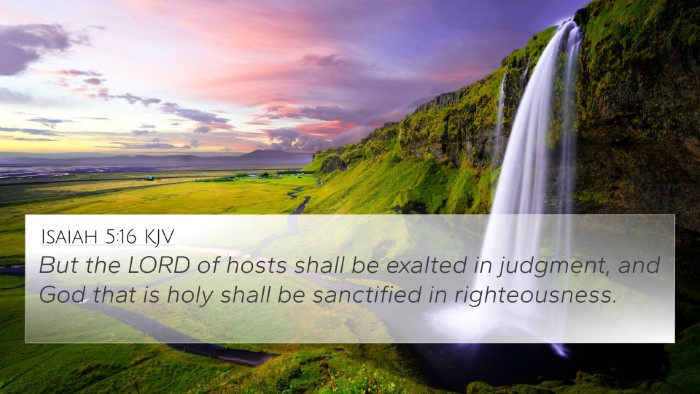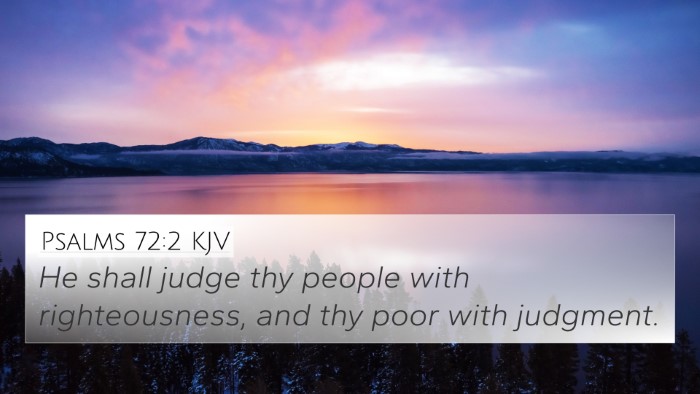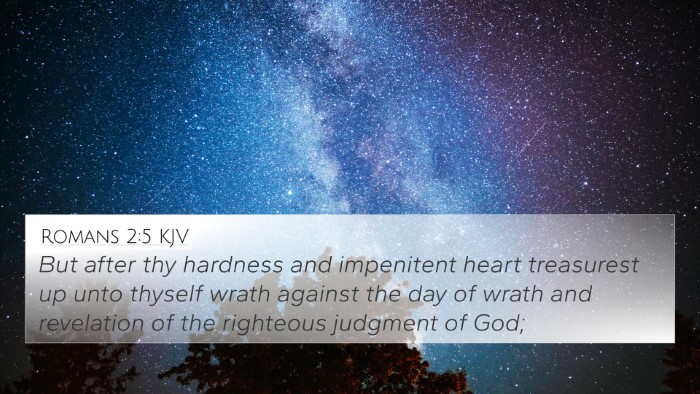Psalms 98:9 Study and Interpretation
Bible Verse: Psalms 98:9
"Before the LORD; for he cometh to judge the earth: with righteousness shall he judge the world, and the people with equity."
Meaning and Interpretation
The verse from Psalms 98:9 speaks profoundly about the coming of the Lord to judge the earth. The interpretation of this significant verse sheds light on God's righteousness and equity in judgment, underscoring core themes in both the Old Testament and the New Testament.
Overview of Key Themes
- The Coming Judgment: The anticipation of the Lord's return, a crucial eschatological theme.
- Righteousness and Equity: Reflects the character of God and the standards by which He judges.
- God’s Sovereignty: Affirms that God oversees and governs all creation.
Public Domain Commentary Insights
Matthew Henry's Commentary: Henry emphasizes the joyful anticipation of Christ's reign and the justice that comes with it. He elaborates that God's judgment is not arbitrary but is executed with righteousness, providing hope and assurance to believers about the divine order.
Albert Barnes' Commentary: Barnes explores the nature of God's judgment, emphasizing that it is universal, covering all people and nations. He notes the balance of mercy and justice, reinforcing that while God will judge, He equally seeks equity amongst His creations.
Adam Clarke's Commentary: Clarke highlights the prophetic nature of this Psalm, relating it to the eventual second coming of Christ. He connects the passage to the themes of universal judgment and restoration, illustrating how the earth will witness God's righteousness firsthand.
Related Bible Cross References
- Isaiah 11:4: "But with righteousness shall he judge the poor, and reprove with equity for the meek of the earth..."
- 2 Timothy 4:1: "I charge thee therefore before God, and the Lord Jesus Christ, who shall judge the quick and the dead at his appearing and his kingdom."
- Matthew 25:31-32: "When the Son of man shall come in his glory... and he shall separate them one from another..."
- Revelation 20:12: "And I saw the dead, small and great, stand before God; and the books were opened..."
- Romans 2:6: "Who will render to every man according to his deeds."
- Psalms 9:8: "And he shall judge the world in righteousness, he shall minister judgment to the people in uprightness."
- Hebrews 9:27: "And as it is appointed unto men once to die, but after this the judgment."
- John 5:22: "For the Father judgeth no man, but hath committed all judgment unto the Son."
- Acts 17:31: "Because he hath appointed a day, in the which he will judge the world in righteousness..."
- Ecclesiastes 12:14: "For God shall bring every work into judgment, with every secret thing..."
Connections Between Bible Verses
The connections between the verses mentioned above and Psalms 98:9 deepen our understanding of divine judgment. They reveal a consistent biblical narrative regarding accountability, justice, and the righteousness inherent in God's character.
Thematic Bible Verse Connections
Across the Scriptures, we can observe recurring themes of righteousness and judgment. For instance, Romans 2:6 and Revelation 20:12 distinctly affirm that judgment is based on the deeds of individuals, reinforcing the message of equitable judgment conveyed in Psalms 98:9.
Scriptural Cross-Referencing Strategies
To explore further, readers may utilize tools for Bible cross-referencing, such as a Bible concordance or a Bible cross-reference guide. These tools enable a deeper study into related passages, facilitating a comprehensive understanding of themes across both Testaments.
Cross-Referencing in Bible Study
Engaging in cross-referencing Bible study methods enhances the study experience. For example, comparing Psalms 98:9 with New Testament teachings helps identify how God's righteousness is manifested through Christ and culminates in the final judgment.
Conclusion
Psalms 98:9 underscores the promised return of the Lord, emphasizing His role as a righteous judge who approaches the earth with equity. Through the insights gleaned from established commentaries and scripture cross-references, believers are encouraged to reflect on God's character and the assurance of divine judgment, which motivates a life aligned with His righteousness.

